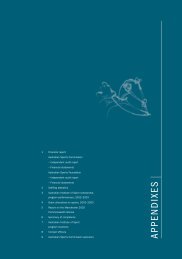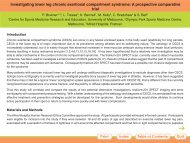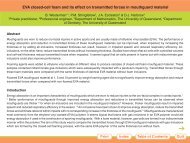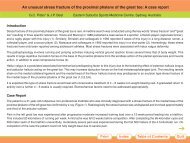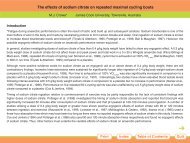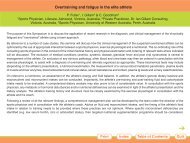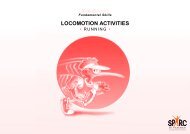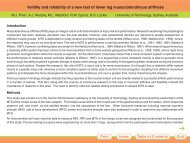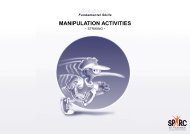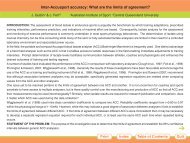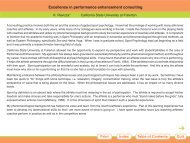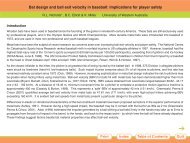2002-03 Annual R eport 2002-03 Annual R eport - Australian Sports ...
2002-03 Annual R eport 2002-03 Annual R eport - Australian Sports ...
2002-03 Annual R eport 2002-03 Annual R eport - Australian Sports ...
You also want an ePaper? Increase the reach of your titles
YUMPU automatically turns print PDFs into web optimized ePapers that Google loves.
Back, left to right: Errol Alcott (Physiotherapist), Darren Lehmann, Matthew Hayden, Jason Gillespie, Andrew Bichel, Shane Watson, Brett Lee, Tim Nielsen (Assistant<br />
Coach/Performance Analyst), Jock Campbell (Physical Performance Manager).<br />
Front, left to right: Michael Bevan, Glenn McGrath, Stephen Bernard (Team Manager), Ricky Ponting (Captain), Adam Gilchrist (Vice-captain), John Buchanan (Coach),<br />
Shane Warne, Damien Martyn.<br />
VB SERIES IN AUSTRALIA, <strong>2002</strong>-<strong>03</strong><br />
<strong>Australian</strong> one-day captain Ricky Ponting enjoyed an outstanding<br />
first home series in charge as he lifted the VB Series trophy<br />
following a keenly fought battle against England and Sri Lanka.<br />
The success helped to make amends for Australia’s failure to<br />
qualify for the finals series for only the third time in history the<br />
previous summer, as well as demonstrating the depth of talent<br />
available to the selectors.<br />
Australia was without three of its leading bowlers for much of<br />
the campaign as Glenn McGrath, Shane Warne and Jason<br />
Gillespie all succumbed to injury. There were other fitness<br />
concerns for fast-bowler Andrew Bichel, all-rounder Shane<br />
Watson and batsman Darren Lehmann, who also missed the<br />
last part of the tournament through suspension.<br />
On paper those problems looked sure to stretch the home side’s<br />
resources, particularly as the selectors were keen to rest other<br />
key players, where possible, ahead of a demanding schedule<br />
involving the World Cup and Test and one-day action in the West<br />
Indies.<br />
However, Australia was able to make light of its apparent<br />
difficulties, thanks to the way other players stepped up to take<br />
opportunities presented to them. In the end, it claimed the finals<br />
series against England, thanks to a crushing 10-wicket win in<br />
Sydney and a thrilling last-over success in Melbourne.<br />
Key among the players who stood up to be counted was fastbowler<br />
Brett Lee. Ponting called for greater consistency from<br />
the player who had a reputation for being expensive as well as a<br />
wicket-taker in the shortened form of the game. Lee responded<br />
brilliantly, leading the attack in the absence of McGrath and<br />
Gillespie, and growing in potency as the series progressed.<br />
Lee finished as the top wicket-taker in the VB Series with 18<br />
victims, and his devastating performance in taking 5-30 in the<br />
Melbourne final not only won a game Australia appeared set to<br />
lose, it also secured him the match and series awards. Form<br />
like that was a prelude to his outstanding World Cup.<br />
75<br />
Without Warne, who dislocated his right shoulder in the<br />
second match of the tournament, Australia looked to Western<br />
Australia’s Brad Hogg to provide the main slow bowling options.<br />
The left-arm wrist-spinner, out of the international scene for<br />
more than four years, was another who rose to the challenge.<br />
Hogg was rarely collared by England or Sri Lanka and finished<br />
with 12 wickets in the series. He was also brilliant in the field<br />
and added to the depth in Australia’s lower order with an unbeaten<br />
71 in the Melbourne final proving to be a crucial innings.<br />
Brad Williams of Western Australia and New South Wales’<br />
Nathan Bracken came into the squad to bolster the fast-bowling<br />
stocks, and both played key roles in the series with Bracken<br />
named man-of-the-match for his three for 21 against England<br />
in Adelaide. Twenty-one-year-old Michael Clarke, also of New<br />
South Wales, stepped in as a late replacement for Lehmann in<br />
Adelaide and announced himself with a wicket, a run-out and a<br />
nerveless unbeaten 39 to help defeat England.<br />
With Matthew Hayden, Adam Gilchrist and Ponting all topping<br />
300 runs, Australia usually had enough runs to bowl at and, as<br />
ever, they scored their runs in attractive fashion.<br />
Australia’s only defeat of the tournament came against Sri<br />
Lanka in Sydney when it conceded the highest score ever made<br />
against it in one-day cricket at home, 5-343, a total made all the<br />
more amazing by the way Sri Lanka had been bowled out for<br />
just 65 by Australia A in Adelaide only two days beforehand.<br />
For the first time since 1997-98, the tournament was not played<br />
as one continuous series of matches because all three sides<br />
had to be in South Africa for the World Cup at the beginning of<br />
February. Consequently, they needed to fit in five of the 12<br />
qualifying games in December, between the third and fourth<br />
Orange Test matches.<br />
Sri Lanka rallied after Christmas, having lost its first three<br />
matches but, aside from its spectacular performance against<br />
Australia in Sydney when both the captain Sanath Jayasuriya<br />
and Marvan Atapattu scored hundreds, it rarely made enough<br />
runs and lacked penetration with the ball.<br />
VB Series in Australia, <strong>2002</strong>-<strong>03</strong>



